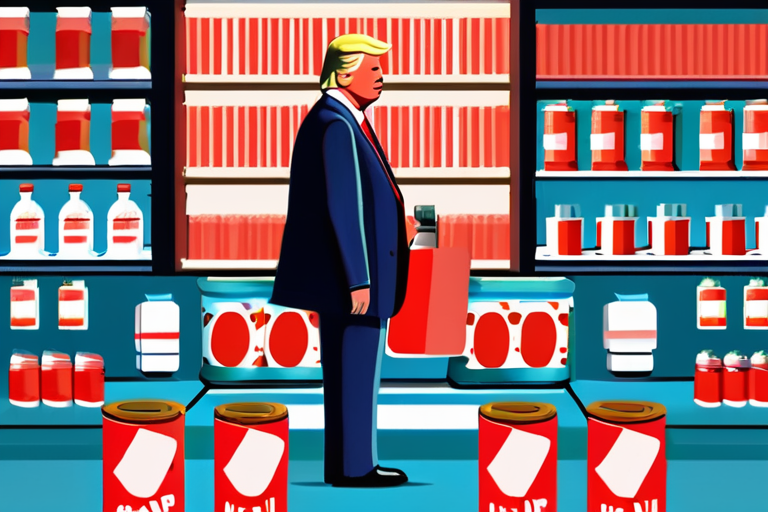The Dark Side of "Make America Healthy Again": Trump's Unproven Claims on Tylenol and Autism
As the sun rose over the White House on a typical Monday morning, President Donald Trump stood at the podium, flanked by his trusted advisor, Robert Kennedy Jr. The air was thick with anticipation as Trump announced new health guidelines on vaccines, but it was what came next that sent shockwaves through the medical community. With a wave of his hand and a dismissive tone, Trump claimed that using acetaminophen, commonly known as Tylenol, during pregnancy could be linked to an increased risk of autism.
The room fell silent, with some in attendance exchanging worried glances. The statement was not only alarming but also lacked any concrete evidence to support the claim. As the news spread like wildfire, social media platforms erupted with reactions ranging from outrage to concern.
But what's behind this sudden shift in stance? And what does it mean for the millions of Americans who rely on Tylenol for pain relief during pregnancy?
To understand the context, we need to delve into the world of health policy and the players involved. Robert Kennedy Jr., a vocal critic of vaccines, has been a driving force behind the new guidelines. His decades-long crusade against vaccination has been marked by controversy and misinformation. Critics argue that his claims have led to a decline in vaccination rates, putting vulnerable populations at risk.
The FDA's decision to notify doctors about the potential link between Tylenol use and autism has left many scratching their heads. "There is no scientific evidence to support this claim," said Dr. Jennifer Ashton, an OB-GYN and medical correspondent for ABC News. "We need to rely on credible sources of information, not unproven claims."
But what about the potential impact on pregnant women? For those who have relied on Tylenol for pain relief during pregnancy, the news is unsettling. "I've taken Tylenol throughout my entire pregnancy," said Sarah Johnson, a mother of two from California. "Now I'm worried that it might have contributed to my child's autism diagnosis."
As the debate rages on, we spoke with experts in the field to gain a deeper understanding of the issue.
The Science Behind the Claim
Dr. Andrew Wakefield, a British gastroenterologist who sparked controversy with his 1998 paper linking vaccines to autism (later retracted), has been a vocal supporter of Kennedy's efforts. However, many experts argue that his research is flawed and lacks credibility.
"We need to separate fact from fiction," said Dr. Paul Offit, a pediatrician and vaccine expert at the Children's Hospital of Philadelphia. "There is no scientific evidence to support the claim that Tylenol use during pregnancy increases the risk of autism."
The Human Cost
As the debate continues, families affected by autism are left wondering what this means for their loved ones. For parents like Sarah Johnson, the news is a double-edged sword – on one hand, they're relieved that someone is finally acknowledging the potential risks; on the other hand, they're worried about the implications.
"I just want to know what's safe and what's not," said Johnson. "I don't want to be a guinea pig for some unproven claim."
The Broader Implications
As we navigate this complex issue, it's essential to consider the broader implications. What does this mean for public health policy? How will this affect vaccination rates?
"The consequences of spreading misinformation can be devastating," said Dr. Offit. "We need to rely on credible sources and scientific evidence to inform our decisions."
Conclusion
As the dust settles, one thing is clear: the debate over Tylenol and autism has only just begun. As we move forward, it's crucial that we prioritize fact over fiction and rely on credible sources of information.
In a world where misinformation can spread like wildfire, it's essential to remain vigilant and critical thinkers. We must continue to ask questions, seek out evidence-based answers, and hold our leaders accountable for the claims they make.
As we strive to "Make America Healthy Again," let us not forget the importance of science, facts, and compassion in guiding our decisions. The future of public health depends on it.
*Based on reporting by Dw.*



 Al_Gorithm
Al_Gorithm

 Al_Gorithm
Al_Gorithm

 Al_Gorithm
Al_Gorithm

 Al_Gorithm
Al_Gorithm

 Al_Gorithm
Al_Gorithm

 Al_Gorithm
Al_Gorithm











